-
30 June - 16 December 2023 Sabatini Building, Floor 3
The Institute of Suspended Time
Exhibition at the Office of the Instituto del Tiempo Suspendido and Activations
The Instituto del Tiempo Suspendido (Institute of Suspended Time, ITS) was founded in 2020 as a critique of the chrono-normativity that underpins our society. Straddling art and philosophy, politics and poetics, ITS looks to question the predominant temporal regime with the aim of recovering the time that is taken from us by the speeding-up of work and social media, a time expropriated by the temporal consensus that governs our lives today.
The ITS office is located on the third floor of the Sabatini Building, where Raquel Friera and Javier Bassas welcome those wishing to suspend time…
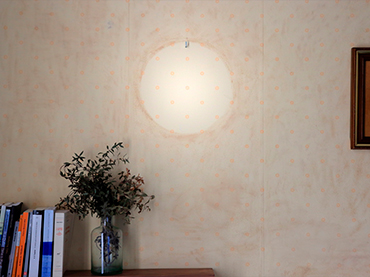
-
Saturday, 1 July 2023 Sabatini Building, Garden
Dance Hall to Wobble Time
Performance with Elena Córdoba, Nilo Gallego, Julián Mayorga, Christian Pérez Yates and Laura Ramírez Ashbaugh
TicketsBefore using seconds, time was measured with the heartbeat. The length of time a beat took to repeat itself was an intimate and sound-based measurement of time. Beats were introduced into music to mark the rhythm of the body in dance, just as the heartbeat does in life.
This dance hall looks to invoke a time made from the softness of the palpitations of the blood in the veins, time which sways our bodies, beat by beat; a muscular, happy time. It puts forward a journey from bolero to rave, from cumbia to disco, a journey danced so that time runs behind our bodies and sticks to our hips like breath on glass.
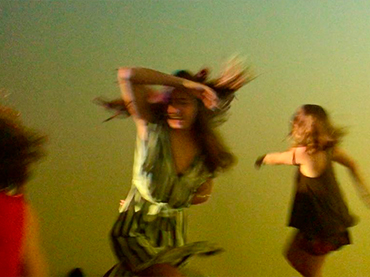
-
Saturday, 15 July 2023 Retiro Park, Palacio de Velázquez
The Life of Las Niñas. The History of Poppies that Escaped Among the Wheat
Performance by Las Niñas
TicketsThe Andalusian drag collective Las Niñas move their patio-house over to the Retiro Park to offer a folkloric catharsis, where all spectrums of their unique imaginary take shape, from their background as a collective to the individual paths of their members.
Mixing the modern and the traditional — from copla and flamenco to electronic music and techno — the performance by Las Niñas merges into the same space in time and transvestite experience. A queer, transvestite and Andalusian incentive in an era when there is barely space for listening, observation and artistic experience.
Additional material: Programme

-
20 July - 5 November 2023 Retiro Park, Palacio de Velázquez
Bayanihan Re-existence
An Installation by Husos arquitecturas
The work of Husos arquitecturas — an architecture and urbanism office operating between Spain and Colombia — explores the possibilities of the quotidian from an ecological approach and looks for a more responsible and circular management of the material, reusing theoretically disposable elements. Re-existencias Bayanihan (Bayanihan Re-existence), their installation in the Retiro Park’s Palacio de Velázquez, invites rest, reading and shared time and reflection around the colonial narratives that loom over the building.
Thus, the stage created to host events and activities in the Notes for a Time Apart programme redraws the inside of the nineteenth-century building via recycled elements, for instance the old set designs from the storerooms of the Centro Dramático Nacional. The piece also features a collaboration with designer Nayare Soledad Otorongx and writer Karessa M. Ramos.

-
Saturday, 16 September 2023 Sabatini Building, Garden
Sound Cuts
Others to the Front with Fefa Vila
TicketsSound Cuts is an out-of-sync, political and danceable manifesto: a three-hour assemblage based on three hours of rhythmic, spoken and danced sound cuts to a house cadence which shapes an exquisite sound corpse. A time where dance, politics and life are expressed in different and analogous proportions, and can hopefully occur at the same time.
This activity sets out to activate collective corporal practices, experiences and impressions which are at odds with normative forms of feeling, assessing, ordering and experimenting with time; time that comes from afar, from the deep sound cut stemming from underground house culture, and which in this encounter is folded and creased to remind us we do not all occupy the same now.
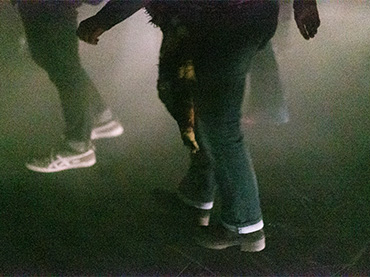
-
Friday, 22 September 2023 Retiro Park, Palacio de Velázquez
This Line Is a Reciprocal Line of Exchange
Performance Poetry Action
TicketsPoetry is a free and independent territory, a refuge for human beings’ individual and collective reflection opposite their time in search of giving meaning to and narrating existence.
In this performance poetry action, poet Helena Mariño and musician Enri La Forêt suspend us in an elastic, bended time to explore other possible durations of language from poetry and sound.
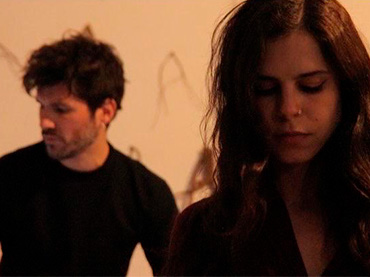
-
Saturday, 23 September 2023 Retiro Park, Palacio de Velázquez
The Hills Are Yours (Live Set)
Performance by Alberto Cortés
TicketsThe performance Los montes son tuyos (Live-set) (The Hills Are Yours. Live Set) imagines campfires in a room, hall or corridor turned into a fictional forest, where we gather around light to hear without barely seeing, searching for introspection.
Although it appears to be a reading, the encounter looks for the narrated story to return to its original covenant, ending, essentially, with the idea of a dramatized reading. It puts forward a space in which to listen and inhabit the imagined and passes through Los montes son tuyos (Continta Me Tienes, 2022) without being a stage or book.
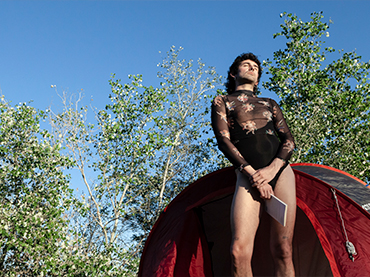
-
Wednesday, 27 September 2023 Sabatini Building, Garden
Elise Florenty and Marcel Türkowsky. Time and Delirium; Dream and Resistance
Screening and Talk
Artist/film-maker duo Elise Florenty and Marcel Türkowsky — currently participants in the Museo Reina Sofía’s Joaquim Jordá Residencies programme — present in this screening and conversation extracts from their films, shot over the past decade in different geographical locations: Donetsk, the island of Lemnos, the Tehuacán Valley, Tokyo and the northern part of the Mississippi River. Pivoting around these images, the film-makers reflect on the TDDR concept (Time and Delirium; Dream and Resistance) as a productive and transformative process which alters set identities and opens the way for new subjectivities to emerge. Delirium is conceived as the ability to connect with the cosmic, moving beyond hierarchical thought; Dream is the chance to break the temporal linearity of reasoning that is thought of as progress; Resistance is a constant echo through time.

-
4 October - 30 November 2023
Not Yet, Still
Probationary Stage Practice with Paz Rojo
Ha sido aún no, todavía (Not Yet, Still) investigates the encounter with the time we live in. Drawing inspiration from contemporary materialism and ecological thought, this project explores the relationship between dance, the unknown and aesthetic experience and what could be sensed as a decline in the present’s historicity.
This proposal by artist and choreographer Paz Rojo is articulated in three laboratories with adults and teenagers, in a stage iteration and seminar.
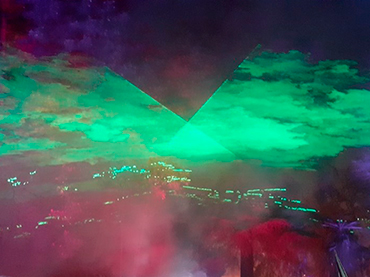
-
14 October – 23 November 2023
ISHUWEI MØSIK KØSHPUNINUK (Female Spirit Dance)
Julieth Morales, artist in residence
On account of the experimental and essay-based approach that underpins the Notes for a Time Apart programme, Misak artist Julieth Morales (Cauca, Colombia, 1992) has been invited to hold a residency in the Museo.
Morales’s practice is situated at the intersection between gender and decoloniality and focuses specifically on notions of Indigenous identity and ritual. During her residency, she will carry out research into other possible temporalities.
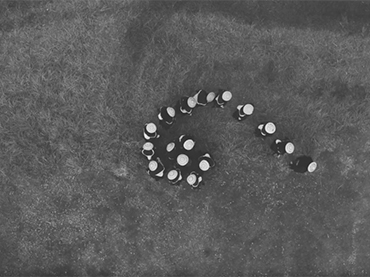
-
Friday, 20 October 2023 Retiro Park, Palacio de Velázquez
Learn to Rub (Time to Write)
Performance with Jérémie Bennequin
TicketsIn 2008, artist Jérémie Bennequin started to erase Marcel Proust’s work In Search of Lost Time. Following a stringent ritual, he rubbed out one page a day over ten years using an eraser, eliminating this literary monument. A long-term undertaking, exacting work, an absurd obsession: an apparent waste of time. In this intervention, the artist repeats part of this gesture, inviting us to reflect on memory, literature and temporality, central themes in his practice.

-
25 October – 4 December 2023 Nouvel Building, Roof
Still Remains
An Installation by elii [oficina de arquitectura] and Orkan Telhan
The installation Still Remains puts forward, from a position which is distanced from Anthroprocentrism, research on the microbiome: the community of micro-organisms inhabiting a set environment, both inside and outside the human body, and governed by characteristic temporal logics and scales. In these life forms — bacteria, fungi and viruses that are invisible to the naked eye — our interspecies identities are hidden in a continuous mutation.
This project from the elii architecture office and artist Orkan Telhan approaches this intimate space via a series of conserved remains, from prolonged “conversations” between micro-organisms and people to highlight a temporality that belongs to no-one.
![elii [oficina de arquitectura] and Orkan Telhan, Still Remains, 2023. Photograph: ImagenSubliminal elii [oficina de arquitectura] and Orkan Telhan, Still Remains, 2023. Photograph: ImagenSubliminal](https://recursos.museoreinasofia.es/legacy_programs/restos_suspenso_snippet_0.jpg)
-
Wednesday, 25 October 2023 Retiro Park, Palacio de Velázquez
What Resonates (Writing a River)
Writing Workshop Around the Reading Club Other Books and So, with Romina Casile
The reading club Other Books and So, inside the Museo Reina Sofía’s Almost Books programme, has been articulated in the last two years via expanded temporalities, gradually shaping a like-minded community of readers. This workshop with Romina Casile invites participants from the club’s previous editions to encounter each other once again in an exercise of collaborative writing which uses as a substrate the readings proposed in the most recent calls and the reverberations that unfolded within them.
![Romina Casile, Otras formas de contar(nos) y reafirmar(nos) (Other Forms of Talking [About] and Reaffirming [Ourselves]), workshop, Matadero Madrid, 2023. Photograph: Estudio Perplejo Romina Casile, Otras formas de contar(nos) y reafirmar(nos) (Other Forms of Talking [About] and Reaffirming [Ourselves]), workshop, Matadero Madrid, 2023. Photograph: Estudio Perplejo](https://recursos.museoreinasofia.es/legacy_programs/romina_casile.jpg)
-
Saturday, 4 November 2023 Retiro Park, Palacio de Velázquez
Pixel Play
Workshop with Juan Alonso
This workshop with Juan Alonso prompts experimentation with generative art; that is, artistic creation based on rules, as in Sol LeWitt’s Wall Drawings. The dynamic involves proposing a series of instructions to create different pieces, using the walls of the Palacio de Velázquez as a canvas and post-it notes as pixels. The aim of the exercise, developed both individually and in groups, is to fashion an ephemeral gallery of shared creations, where each piece bears witness to a possible interpretation of the instructions provided.

-
Tuesday, 7 November 2023 Retiro Park, Palacio de Velázquez
Walking Is Defensive Magic
Drift with BRUTALISTAS
TicketsThe Ruta emocional de Madrid (Emotional Route of Madrid, 1935) is the great guide — or anti-guide — of old Madrid, a beautiful anthology on a major city that was withdrawn to make way for new times. The person behind it was Emilio Carrere, a poet, bohemian and mystical flâneur who, through the work, was situated at the dawn of psychogeography and a defence of wandering as a method of reflection and the search for new perspectives.
Taking Carrere’s book as his point of departure and with time as an overriding focal point, Servando Rocha and David Bizarro, hosts of Editorial La Felguera’s podcast BRUTALISTAS, puts forward a route around Madrid’s Retiro Park to visit some of its innermost spaces and also some of its most illustrious, all through a noir and “brutalist” gaze.
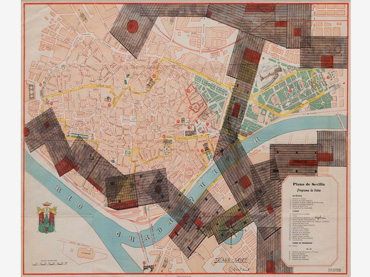
-
Tuesday, 12 December 2023 Nouvel Building, Auditorium 200
Fearing It’s Too Late
Encounter with Women Artists
TicketsTime in our present is marked by certain rhythms, devices and structures that regulate all spheres of life (work, family, leisure, social relationships…) in a way that is alienating and standardised. Women, as subaltern or dissident subjects of the heteropatriarchy, are affected largely by overloads imposed by today’s frenetic rhythms.
This multidisciplinary encounter between writer Azahara Alonso, anthropologist Adela Franzé and philosopher Elena Castro Córdoba puts forward a search for escape routes and solutions to temporality and the demands of over-production in contemporary society. It sets out a dialogue around non-productive cadence, queer temporalities and the possibilities of confronting the speed of contemporary rhythms.
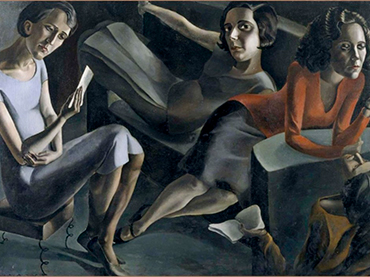
-
Friday, 15 December, 2023 Nouvel Building, Auditorium 200
TIME
The recording of a new episode of the BRUTALISTAS podcast
TicketsBRUTALISTAS (BRUTALISTS) is a podcast by Editorial La Felguera, whereby Carlos Arévalo, David Bizarro and Servando Rocha make use of an old guerrilla transmitter, letting their noir and brutalist imaginary loose. The activity observes the recording of a new episode of this podcast, in which its hosts reflect and speculate on time and its possibilities and contradictions.
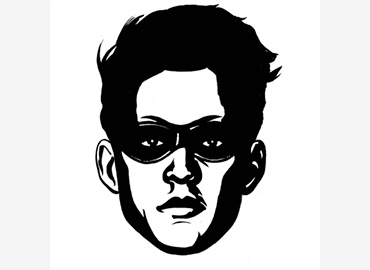
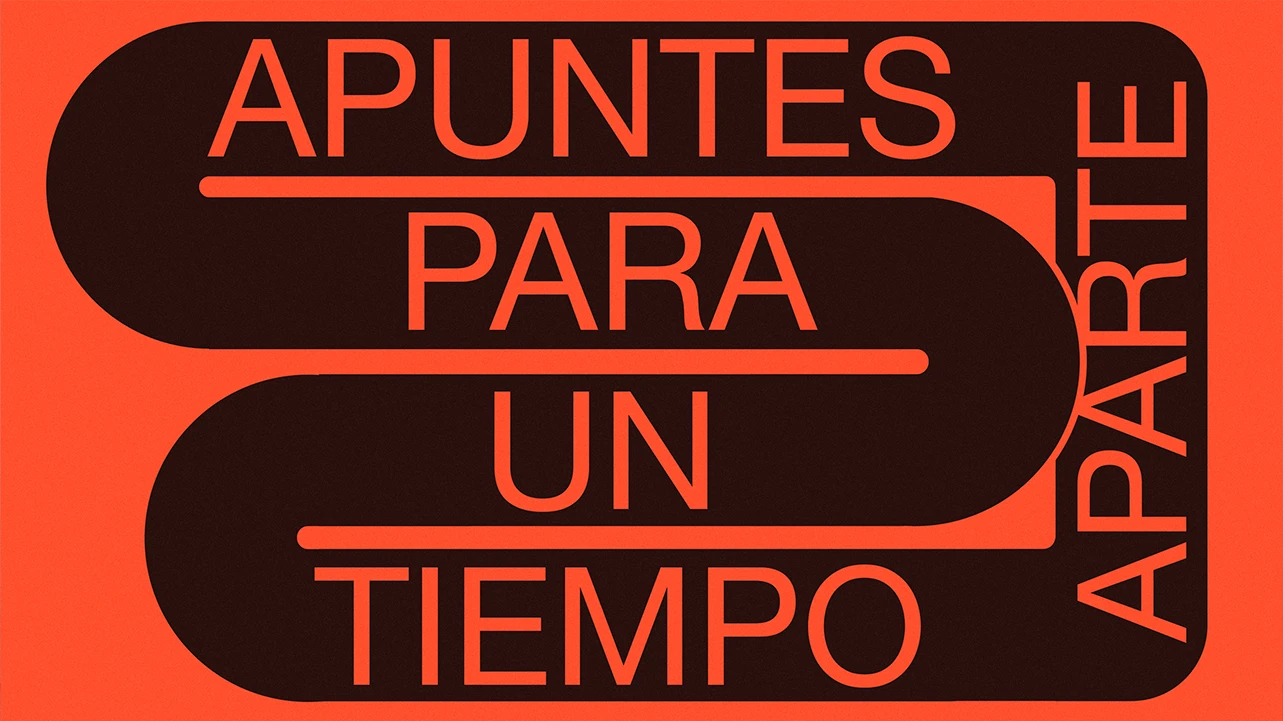
Held on 30 Jun, 06, 13, 20, 27 Jul, 03, 10, 17, 24, 31 Aug, 07, 14, 21, 28 Sep, 05, 12, 19, 26 Oct, 02, 16, 23, 30 Nov, 07, 14 Dec 2023
Notes is a new Museo Reina Sofía project which aims to explore other formats and methodologies to accommodate devices and projects which transversally make disciplines hybrid and ensure they are capable of working on processes from erraticism as a possibility.
Its first edition, Notes for a Time Apart, sets forth a reflection on the customary conceptions of time and its registers, scales and rhythms. From different perspectives — philosophy, decolonial thought, queer theory, physics and biology — other modes of conceiving time are approached, beyond its normative and purely metric side.
Under these premises, artistic and architectural installations, film and live arts, publications, workshops, seminars and other devices take shape over six months from and in different spaces inside the Museo.
Organiza
Museo Reina Sofía
Patrocina
Participants
Azahara Alonso holds a degree in Philosophy and is the author of the book of aphorisms Bajas presiones (Ediciones Trea, 2016) and the poetry collection Gestar un tópico (RIL Editores, 2020). She has been coordinator of the writing school Hotel Kafka and a cultural manager in the José Hierro Poetry Centre Foundation. Currently, she conducts literary workshops and publishes specialised critique, and in her most recent work Gozo (Siruela, 2023) she reflects on themes such as work, tourism, the body, rest and leisure.
Juan Alonso holds a degree in IT, with an MA in Sound and Music Computing from Aalborg Universitet (Denmark). In his work he combines technology teaching from a humanist point of view with the creation of works that re-imagine reality through the prism of social critique, technology and humour. He is the author En mi casa lo decimos así (Arranca Editorial, 2022).
Javier Bassas is a philosopher, translator and editor. He holds a PhD in French Philology and Philosophy from the Université Paris-Sorbonne, Paris IV, and from the University of Barcelona, where he currently lectures in the Department of French Studies. His work focuses on the relationship between language, politics and aesthetics, and the translation of contemporary French thought.
Jérémie Bennequin is an artist who develops his multi-disciplinary practice around themes of memory and time. In his plastic work, literature is a raw and privileged material with which to create ambiguous works that sit at the crossroads between the legible and the visual. He gained acclaim with Ommage, developed between 2008 and 2016, his own homage to Marcel Proust’s In Search of Lost Time. His subsequent work has commonly adopted the format of the artist’s book, for instance Le Hasard n'abolira jamais un coup de dés (Yvon Lambert, 2014) and Les Lesbiennes (Éditions Dilecta, 2016), while his latest book Les Ommes (Manuella Éditions, 2022) received an honourable mention from the jury at the Prix Bob Calle du livres d’artiste in 2023.
Romina Casile is an artist, researcher and teacher. She holds a degree in Fine Arts from the Universidad Nacional de Rosario, Argentina, and an MA in Research in Artistic and Visual Practices from the University of Castilla-La Mancha (UCLM), where she is currently studying a PhD in Humanities, Art and Education. She is part of UCLM’s research group ARTEA: Research and Stage Creation.
Elena Castro Córdoba holds a qualification in Philosophy from the Complutense University of Madrid and an MA in Gender, Media and Culture from Goldsmiths University in London. Moreover, she is a pre-doctoral FPU contract researcher at the Complutense University of Madrid, a cultural researcher and the co-founder of Ontologías Feministas (Feminist Ontologies), a collective of cultural production specialised in virtuality and education programmes from a feminist perspective.
Elena Córdoba is a dancer and choreographer whose work is built from a detailed observation of the body, the core part and subject matter of her work. She vindicates sensoriality as a form of knowledge and the act of dancing as one of its manifestations. Dance, understood as a human manifestation, forms the backbone of the collective projects Bailar ¿es eso lo que queréis? (2012–2017), Déjame entrar (2017) and ¿Bailamos? (2018–2020).
Alberto Cortés is a stage director, playwright and performer. He started his journey in stage in 2009 from, as he describes it, “a bastard and peripheral dramaturgy that has been getting wilder with the passage of time, towards a freedom that doesn’t arrive”. He creates pieces in different formats and disciplines, in an attempt to keep on having hope in the intangible, mystery and the human. He is the author of Los montes son tuyos (Continta Me Tienes, 2022).
elii is an architecture office founded in 2006 in Madrid by Uriel Fogué, Eva Gil and Carlos Palacios. Its professional practice encompasses teaching, research and publishing, and its projects have been part of the Spanish Pavilion at the Venice Architecture Biennale in 2016 (awarded the Golden Lion) and 2023, and the exhibition Home Stories 100 Years, 20 Visionary Interiors (2020) in the Vitra Design Museum and at the Fifth Istanbul Design Biennial (202–2021). They have also written different publications, for instance What is Home Without a Mother (HIAP – Matadero Madrid, 2015) and Super Petites Maisons (EPFL, 2022) and are the co-editors of UHF, included in the Archive of Madrid Creators.
Elise Florenty and Marcel Türkowsky are an artist/film-maker duo who live between Berlin and Paris. Their short and medium-length films explore socio-political and historical contexts through the prism of altered states of consciousness (lucid insanity, hallucinations, dreams), exhibiting the multiplicity of the self through a spiral of metamorphosis that interrogates the relationship with the Other. They were awarded the EMAF Award for The Sun Experiment (Ether Echoes) (2013–2014) and Conversation with a Cactus (2017), and the Prix Cinéma du Réel for Back to 2069 (2019) and Don’t Rush (2020).
Adela Franzé is head professor in the Department of Social Anthropology and Social Psychology at the Complutense University of Madrid. In her strands of research she reflects on time devices, such as the watch, which regulate and mark our day-to-day rhythm.
Raquel Friera is an artist. With a degree in Economics and Fine Art, her projects combine a critical gaze of economy, gender awareness, historical re-readings and themes such as work and the production of subjectivities. In recent years, she has exhibited her work at different institutions such as CentroCentro (Madrid), MUSAC (León), Casal Solleric (Palma), Fundació Tàpies (Barcelona), Virreina (Barcelona) and MUAC (Mexico). With Javier Bassas, she founded the Instituto del Tiempo Suspendido (ITS).
Nilo Gallego is a musician and artist. In his work, always with a playful element, he looks for an interaction with the environment and the quotidian, and designs tools and conducts educational workshops based on listening and sound creation.
Husos arquitecturas is an office and platform of architecture, gardening and urbanism which explores the possibilities of these practices as tools for social transformation. It was founded in Madrid in 2003 by Colombians Diego Barajas (Bogotá) and Camilo García (Cali). Their work has been on display at the Venice Biennale of Architecture, the Quito Biennale, Rotterdam Biennale, the Oslo Architecture Triennale, Fundación Tàpies and Ecovisionarios. They are the authors of the books Urbanismos de remesas, viviendas (Re)productivas de la dispersión (Caniche, 2017) and Dispersion: A Study of Global Mobility and the Dynamics of a Fictional Urbanism (Episode, 2003).
Enri La Forêt is a musician and producer. He has been artist-in-residence at the Etopia Centre of Art and Technology, and develops performance and sound research with the poet Helena Mariño, with whom he has performed at La Casa Encendida, the Marpoética Festival, Teatro del Barrio and Cruce Contemporáneo, among others.
Helena Mariño is a poet and translator who has published Los bañistas (RIL Editores, 2022) and Este frío no es nuestro (Entropía Ediciones, 2019) and translated the poetry collection Los hijos de enero (Visor, 2022), by Safia Elhillo. She is part of the research and creation collective Una Fiesta Salvaje.
Roberto Martínez is an artist, dancer and stage director who studied Fine Arts at the University of the Basque Country and trained at the Andalusian Dance Centre in Seville and the Centre de Développement Chorégraphique in Toulouse. His interests revolve around the visual arts, botany and performance, and in his practice he explores the association between dance and different artistic expressions such as drawing, painting, sculpture and textile creation. His works most notably include El pintor y la modelo (2007), Me, the son (2014) and Tratado Botánico de Ilustración Coreográfica (2021). As a performer, he has collaborated with Christian Rizzo and Meg Stuart, among others, and as an artistic director, set designer and wardrobe artist he has worked with artists such as the singer-songwriter Rocío Márquez and the producer Bronquio on his record Tercer Cielo (2022).
Julián Mayorga is a musician, producer and artist who lives in Madrid. His music, which emerges from the riskiest wing of the new Latin American tropicalia scene, draws from and explores elements of popular Andean and Antillean music, electronic music, sound experimentation and Colombian folklore. He is part of the Poetas Menores collective and the experimental pop group Flash Amazonas.
Julieth Morales is an artist who defines herself as a “Misak artist by birth and mixed-race by context” and situates her work at the intersection between gender and decoloniality. Her practice, spanning performance, video, photography, painting and drawing, challenges representations of the Indigenous subject and critically reformulates the rituals of her community. She has recently exhibited work in the El Dorado space in Bogotá, the Museo de Arte Moderno in Medellín and the Museo de Arte Contemporáneo in Panama, among others.
Las Niñas is an artist’s collective created in Seville in 2018. Focused on stage and performance arts, transvestiteness and drag, it aims to recover and vindicate Andalusian culture from all artistic and vital areas. Its members are Agu de Barbate, Belial, Josefita Belladona, Berrenga, Carvento, Rosario Molina, Pakita, La Susi, Laca Udilla and Xess.
Christian Pérez Yates is a musician who was born in Florida. He studied jazz in Washington D.C. and moved to Madrid in 2004. His perspective is both open and broad: from the roots of tradition to the most innovative and experimental.
Laura Ramírez Ashbaugh is a choreographer, dancer and DJ who was born in Spain and has Ecuadorian and North American roots. Her research centres on dance, choreography and sound practices, and currently she is immersed in a long-term choreographic research project called serenity rave.
Servando Rocha is a writer and the editor of Editorial La Felguera and the publication Agente Provocador, as well as the BRUTALISTAS podcast he hosts with Carlos Arévalo and David Bizarro. He has published numerous works, most notably La Facción Caníbal. Historia del Vandalismo Ilustrado (Editorial La Felguera, 2012); Nada es verdad, todo está permitido. El día que Kurt Cobain conoció a William Burroughs (Alpha Decay, 2014); Algunas cosas oscuras y peligrosas (Editorial La Felguera, 2019); and Todo el odio que tenía dentro (Editorial La Felguera, 2021).
Paz Rojo is a choreographer, dancer and researcher. Her interests revolve around dance and its potential to create alternative ecologies that include debates on the ontology of dance in late capitalism and the aesthetic of dance after the end of the future. She studied her PhD in Performance Practices, specialising in Choreography at the Stockholm University of the Arts with the research thesis The Decline of Choreography and Its Movement: a Body's (path)Way (2019). As part of this research, she published the book To Dance in the Age of No-Future (Circadian, 2020).
Orkan Telhan is an artist, designer, teacher and researcher who holds a PhD in Design and Computing from MIT’s (Massachusetts Institute of Technology) Architecture Department. He investigates critical questions of cultural, environmental and social responsibility, and his work has been displayed at different editions of the Istanbul Biennial (2013, 2022), the Istanbul Design Biennial (2012, 2016, 2021), Ars Electronica, ISEA, LABoral, Matadero Madrid, the Museum of Contemporary Art Detroit and the New Museum of Contemporary Art in New York.
Others to the Front is a collective that started in January 2021 through the desire to create a non-existent and necessary space to make a critique possible, from music and dance, of a system that oppresses and which dictates policies that exclude the queer community. A political commitment towards transformation, intervention and action from the dancefloor, the club, music and mixing. With different formats and different friends, the collective looks to build a queer-rave community from self-management and autonomy to dance to exhaustion.
Fefa Vila (aka Fefus) is a writer, activist and queer feminist who promotes the artivist dyke-queer collective LSD (Madrid, 1993–1998). She has also been a professor of Sociology in the Methodology and Theory Department at the Complutense University of Madrid since 2008 with her areas of research encompassing cultural studies and gender. She has directed projects as a curator and independent artistic director, for instance El porvenir de la revuelta. Memoria y Deseo LGTBI_Q in 2017. She is a follower of Others to the Front on the political floor of dancing-queering the city.
Más actividades

Difficulty. Forms and Political Effects of Deviation in Writing and Contemporary Art
23 February – 14 December 2026 – Check programme
Difficulty. Forms and Political Effects of Deviation in Writing and Contemporary Art is a study group aligned towards thinking about how certain contemporary artistic and cultural practices resist the referentiality that dominates the logics of production and the consumption of present-day art. At the centre of this proposal are the concepts of difficulty and deviation, under which it brings together any procedure capable of preventing artistic forms from being absorbed by a meaning that appears previous to and independent from its expression. By ensuring the perceptibility of their languages, difficulty invites us to think of meaning as the effect of a signifying tension; that is, as a productive and creative activity which, from the materiality of art objects, frees aesthetic experience from the representational mandate and those who participate in it from the passiveness associated with tasks of mimesis and decoding.
The economy of the referential norm translates the social logic of capitalism, where insidious forms of capturing subjectivity and meaning operate. In the early 1980s, and adopting a Marxist framework, poet Ron Silliman highlighted how this logic entailed separating language from any mark, gesture, script, form or syntax that might link it to the conditions of its production, rendering it fetichised (as if without a subject) and alienating its users in a use for which they are not responsible. This double dispossession encodes the political strategy of referential objectivity: with no subject and no trace of its own consistency, language is merely an object, that reality in which it disappears.
The political uses of referentiality, more sophisticated today than ever before, sustain the neoliberal-extractivist phase of capitalism that crosses through present-day societies politically, economically and aesthetically. Against them, fugitive artistic practices emerge which, drawing from Black and Queer studies and other subaltern critical positions, reject the objective limits of what exists, invent forms to name what lies outside what has already been named, and return to subjects the capacity to participate in processes of emission and interpretation.
Read from the standpoint of artistic work, the objective capture of referentiality may be called transparency. Viewed from a social contract that reproduces inequality in fixed identity positions, transparent in this objectivity are, precisely, the discourses that maintain the status quo of domination. Opposite the inferno of these discourses, this group aims to collectively explore, through deviant or fugitive works, the paradise of language that Monique Wittig encountered in the estranged practices of literature. For the political potency of difficulty — that is, its contribution to the utopia of a free language among equals — depends on making visible, first, its own deviations; from there, the norm that those deviations transgress; and finally, the narrowness of a norm which in no way exhausts the possibilities ofsaying, signifying, referring and producing a world.
From this denouncement of referential alienation, fetishisation and capture, Difficulty. Forms and Political Effects of Deviation in Writing and Contemporary Art turns its attention to the strategies of resistance deployed by contemporary artists and poets. Its interest is directed towards proposals as evidently difficult or evasive as those of Gertrude Stein, Lyn Hejinian, Theresa Hak Kyung Cha, Kameelah Janan Rasheed, Kathy Acker, María Salgado and Ricardo Carreira, and as seemingly simple as those of Fernanda Laguna, Felix Gonzalez Torres and Cecilia Vicuña, among other examples that can be added according to the desires and dynamics of the group.
The ten study group sessions, held between February and December, combine theoretical seminars, work with artworks from the Museo Reina Sofía’s Collections and exhibitions, reading workshops and public programs. All these formats serve as spaces of encounter to think commonly about certain problems of poetics — that is, certain political questions — of contemporary writing and art.
Difficulty. Forms and Political Effects of Deviation in Writing and Contemporary Art inaugurates the research line Goodbye, Representation, through which the Museo Reina Sofía’s Studies Directorship seeks to explore the emergence of contemporary artistic and cultural practices which move away from representation as a dominant aesthetic-political strategy and redirect their attention toward artistic languages that question the tendency to point, name and fix, advocating instead for fugitive aesthetics. Over its three-year duration, this research line materializes in study groups, seminars, screenings and other forms of public programming.

Institutional Decentralisation
Thursday, 21 May 2026 – 5:30pm
This series is organised by equipoMotor, a group of teenagers, young people and older people who have participated in the Museo Reina Sofía’s previous community education projects, and is structured around four themed blocks that pivot on the monstrous.
This fourth and final session centres on films that take the museum away from its axis and make it gaze from the edges. Pieces that work with that which is normally left out: peripheral territories, unpolished aesthetics, clumsy gestures full of intent. Instead of possessing an institutional lustre, here they are rough, precarious and strange in appearance, legitimate forms of making and showing culture. The idea is to think about what happens when central authority is displaced, when the ugly and the uncomfortable are not hidden, when they are recognised as part of the commons. Film that does not seek to be to one’s liking, but to open space and allow other ways of seeing and inhabiting the museum to enter stage.

Intergenerationality
Thursday, 9 April 2026 – 5:30pm
This series is organised by equipoMotor, a group of teenagers, young people and older people who have participated in the Museo Reina Sofía’s previous community education projects, and is structured around four themed blocks that pivot on the monstrous.
The third session gazes at film as a place from which to dismantle the idea of one sole history and one sole time. From a decolonial and queer perspective, it explores films which break the straight line of past-present-future, which mix memories, slow progress and leave space for rhythms which customarily make no room for official accounts. Here the images open cracks through which bodies, voices and affects appear, disrupting archive and questioning who narrates, and from where and for whom. The proposal is at once simple and ambitious: use film to imagine other modes of remembering, belonging and projecting futures we have not yet been able to live.

Remedios Zafra
Thursday March 19, 2026 - 19:00 h
The José Luis Brea Chair, dedicated to reflecting on the image and the epistemology of visuality in contemporary culture, opens its program with an inaugural lecture by essayist and thinker Remedios Zafra.
“That the contemporary antifeminist upsurge is constructed as an anti-intellectual drive is no coincidence; the two feed into one another. To advance a reactionary discourse that defends inequality, it is necessary to challenge gender studies and gender-equality policies, but also to devalue the very foundations of knowledge in which these have been most intensely developed over recent decades—while also undermining their institutional support: universities, art and research centers, and academic culture.
Feminism has been deeply linked to the affirmation of the most committed humanist thought. Periods of enlightenment and moments of transition toward more just social forms—sustained by education—have been when feminist demands have emerged most strongly. Awareness and achievements in equality increase when education plays a leading social role; thus, devaluing intellectual work also contributes to harming feminism, and vice versa, insofar as the bond between knowledge and feminism is not only conceptual and historical, but also intimate and political.
Today, antifeminism is used globally as the symbolic adhesive of far-right movements, in parallel with the devaluation of forms of knowledge emerging from the university and from science—mistreated by hoaxes and disinformation on social networks and through the spectacularization of life mediated by screens. These are consequences bound up with the primacy of a scopic value that for some time has been denigrating thought and positioning what is most seen as what is most valuable within the normalized mediation of technology. This inertia coexists with techno-libertarian proclamations that reactivate a patriarchy that uses the resentment of many men as a seductive and cohesive force to preserve and inflame privileges in the new world as techno-scenario.
This lecture will address this epochal context, delving into the synchronicity of these upsurges through an additional parallel between forms of patriarchal domination and techno-labor domination. A parallel in which feminism and intellectual work are both being harmed, while also sending signals that in both lie emancipatory responses to today’s reactionary turns and the neutralization of critique. This consonance would also speak to how the perverse patriarchal basis that turns women into sustainers of their own subordination finds its equivalent in the encouraged self-exploitation of cultural workers; in the legitimation of affective capital and symbolic capital as sufficient forms of payment; in the blurring of boundaries between life and work and in domestic isolation; or in the pressure to please and comply as an extended patriarchal form—today linked to the feigned enthusiasm of precarious workers, but also to technological adulation. In response to possible resistance and intellectual action, patriarchy has associated feminists with a future foretold as unhappy for them, equating “thought and consciousness” with unhappiness—where these have in fact been (and continue to be) levers of autonomy and emancipation.”
— Remedios Zafra

27th Contemporary Art Conservation Conference
Wednesday, 4, and Thursday, 5 March 2026
The 27th Contemporary Art Conservation Conference, organised by the Museo Reina Sofía’s Department of Conservation and Restoration, with the sponsorship of the Mapfre Foundation, is held on 4 and 5 March 2026. This international encounter sets out to share and debate experience and research, open new channels of study and reflect on conservation and the professional practice of restorers.
This edition will be held with in-person and online attendance formats, occurring simultaneously, via twenty-minute interventions followed by a five-minute Q&A.
